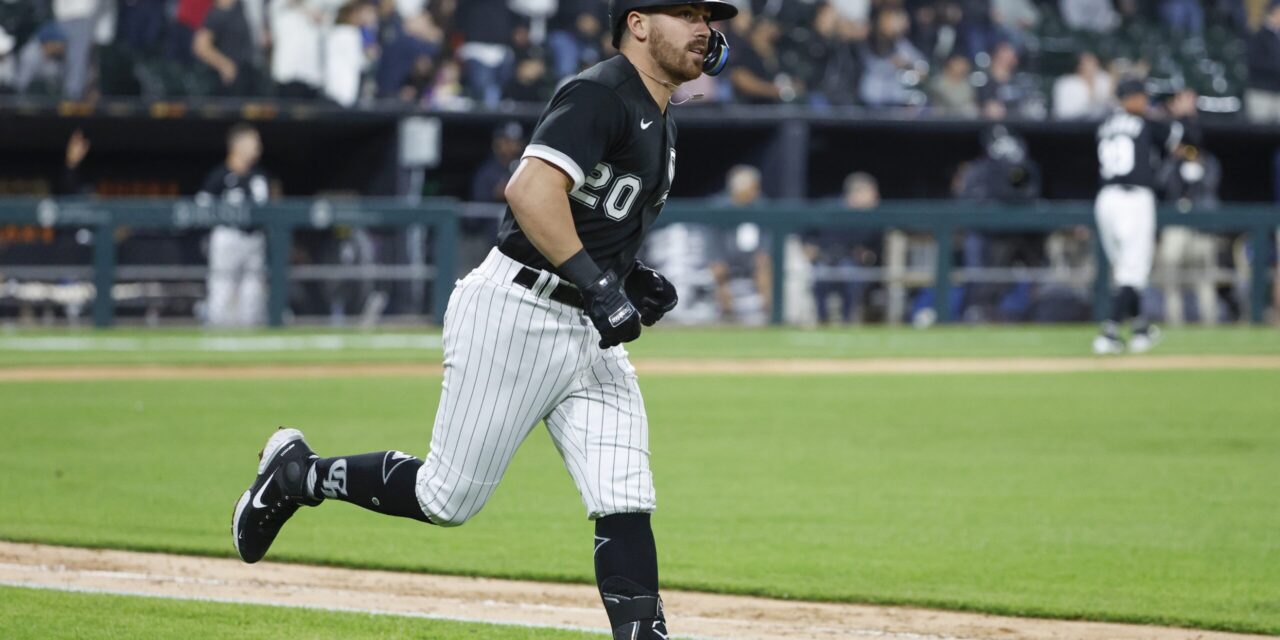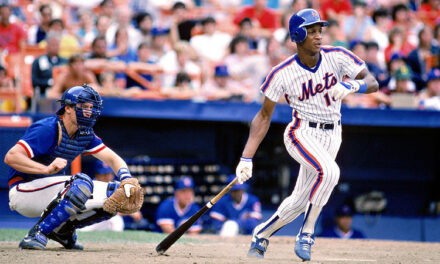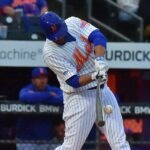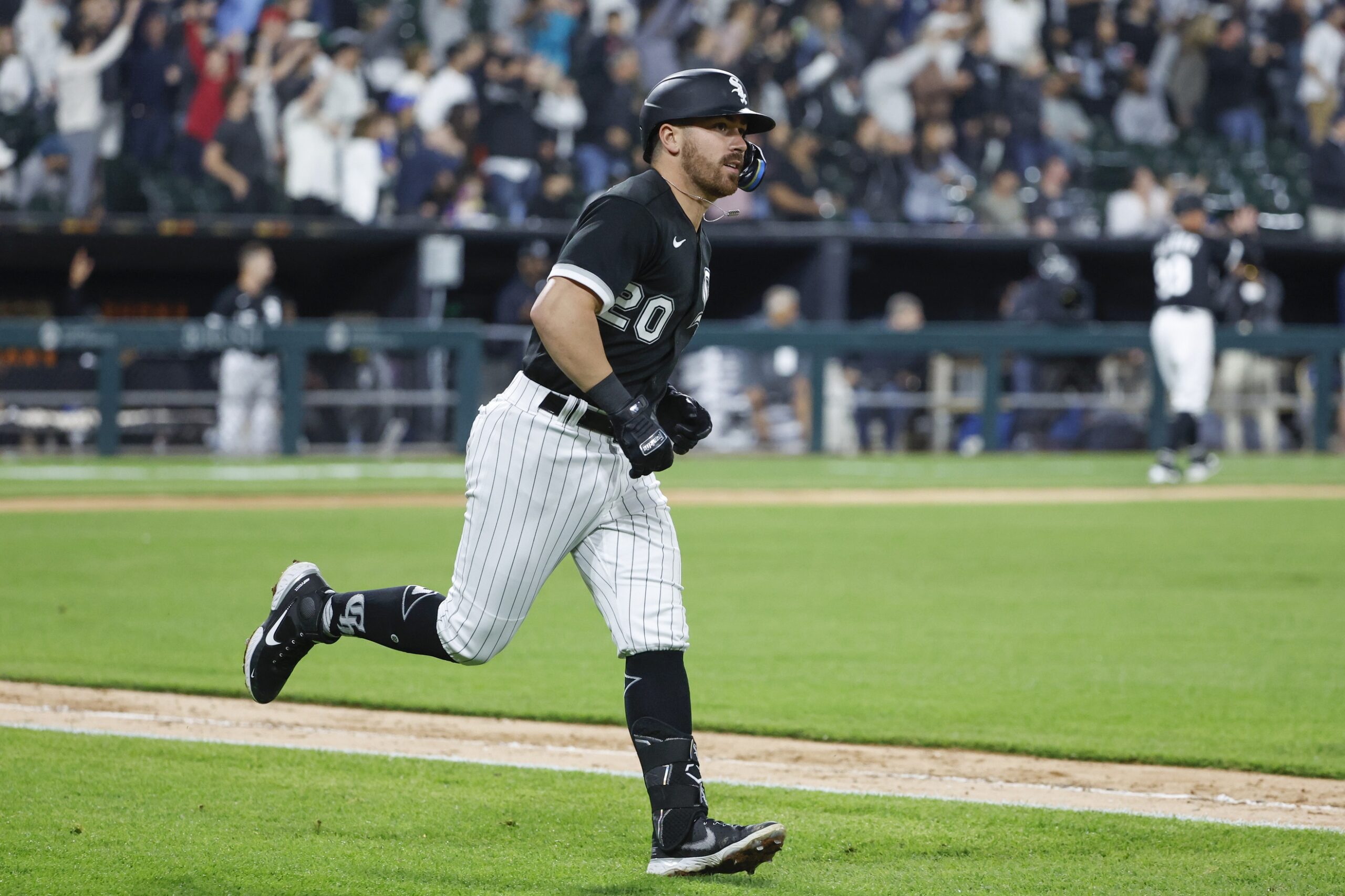
Kamil Krzaczynski-USA TODAY Sports
Amid a busy offseason for the New York Mets, in which the club committed nearly $500 million to free agents, utility player Danny Mendick may have gone unnoticed.
Signed to a one-year, $1 million deal in late December, Mendick, 29, offers the Mets a versatile depth option who still has two minor league options remaining.
The Rochester native’s story is one of perseverance, as he received no collegiate offers out of high school, and was later drafted by the Chicago White Sox in the 22nd round of the 2015 MLB Draft.
Mendick has played all over the diamond in the White Sox’ organization, including 3,000+ plus innings at shortstop, 1,600+ innings at second base, 750+ innings at third base, over 150 innings in the outfield and one scoreless inning pitched.
He made his major league debut on September 3, 2019, appearing as a pinch runner in the White Sox’ 6-5 win over Cleveland on the road. Mendick posted a .308 batting average with a 107 OPS+ in 40 plate appearances in the last month of the regular season.
Since then, Mendick has appeared in parts of the next three seasons, playing in a career-high 71 major league games in 2021.
His breakout year came in 2022 when he appeared in 31 games and posted career highs in on-base percentage (.343), wRC+ (125) and fWAR (0.8). Mendick got a prolonged look at shortstop, as he filled in for two-time All-Star Tim Anderson after he went on the IL with a groin injury in late May.
Unfortunately, Mendick’s ’22 season came to an abrupt end on June 22nd, as he collided with teammate Adam Haseley on a foul popup down the left field line. He underwent surgery on his right knee to repair a torn ACL and has been rehabbing and working his way back to full strength.
After being non-tendered by the White Sox this offseason, Mendick is excited for a new opportunity with the Mets. While his signing didn’t provoke much fanfare, adding a versatile player such as Mendick provides the Mets a solid depth option which is always needed over the course of a 162-game season.
I had the privilege of speaking with Mendick in early January, where he discussed growing up in upstate New York, how former Mets Willie Harris and Joe McEwing aided in his development and signing with the Mets.
MMO: Who were some of your favorite players growing up?
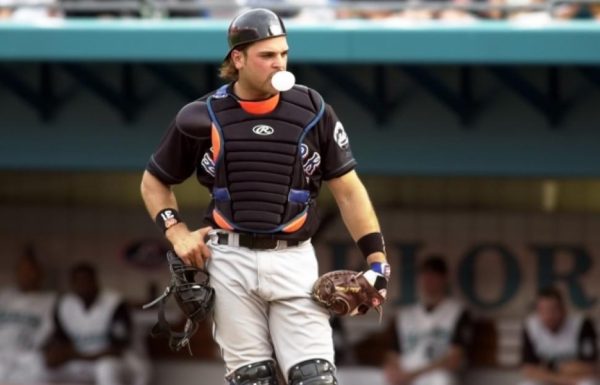
Mendick: I was always a big Derek Jeter fan and I really liked Mike Piazza. I didn’t really watch the Mets as much, but I loved the way that guy played and his story. But I was always a Jeter guy.
As I grew older, I enjoyed watching the game. So, that’s kind of what it came to.
MMO: What was it like growing up and playing baseball in upstate New York?
Mendick: It was cold, that’s for sure. [Laughs.] It’s cool though because it’s different from the guys that always lived in the warm weather. When the warmth started to come around and you were getting closer to springtime, you were really chomping at the bit.
I always felt like I had that kind of edge where once the weather started to get nice you were like, man, I can’t wait to get outside and play, rather than those guys that just played year-round. That’s what I enjoyed the most was looking forward to when the snow was gone and being able to play.
MMO: I read that your grandfather has been a season ticket holder of the Rochester Red Wings for decades. Is that right?
Mendick: Yeah, I kind of grew up on that. We would go to Red Wings games whenever they were home, and on Friday nights we would always go. I was always around the game and watching that I was like, Man, I can do this.
My dad was the one that said, “There’s nothing you can’t do.” Fast forward a little bit and here we are.
MMO: There’s nothing like watching a minor league game. The atmosphere is great and it’s fun to see the future talent of the sport early on.
Mendick: I think that’s what sometimes gets lost. When people watch you in the big leagues, sometimes they forget how many levels you went through and how many guys got whittled away. When you get there, you’re playing against the best of the best.
MMO: Can you talk about your journey from not receiving any collegiate scholarships for baseball out of high school to eventually ending up at the University of Massachusetts Lowell?
Mendick: I was a smaller guy out of high school and I never really got looked at like that. I had a look at Niagara my senior year but it just didn’t end up working out. I went to Monroe Community College in Rochester and played there.
In my sophomore year they had a pro day, and I’ll never forget this, I wasn’t invited. Long story short, I was the only one that ended up playing pro out of all of the guys that went.
I ended up going to UMass Lowell because the coach liked how I played. We were playing against Hartford, Connecticut, and Sean Newcomb was pitching that day. In BP (batting practice) my thing was I just laid out for balls. I was at short and I’d just lay out there in BP.
That’s how I ended up getting drafted because all the scouts there were looking for Newcomb, and they were there watching BP and kind of just picked up on my attitude and play. I got drafted by the White Sox because of that day.
MMO: What are your memories from the 2015 MLB Draft in which you were selected in the 22nd round?
Mendick: The Cubs told me that they were going to take me in the back-half of the top ten. That went through and that was the second day, and I didn’t get drafted. I was like, All right, tomorrow I’m going to play golf. And if it happens, it happens.
I played 36 holes that day. On the second half of the second eighteen, I got a call from the White Sox telling me they drafted me in the 22nd round and if I want to come to Arizona. It was a plane ticket and a dream.
MMO: I read an article where you talked about the impact Willie Harris had on you in the minor leagues in 2017. Can you talk about how Harris aided in your development?
Mendick: He was really helpful. I was a grindy, little player and that’s what I pride myself on. He really emphasized and talked to me about how to not care about the stuff that you can’t control, and to just have a chip on your shoulder when you play.
Obviously, it’s a team sport and you’re playing with the guys on your team and playing for them, but when you get in that batter’s box, he really taught me how to put that mentality of it’s me versus this guy. I’m not going to go up there and half-ass something, I wouldn’t do that in general in life, why would I half-ass an at-bat? I’m going up there one-on-one and I’m going to get mine. I’m going to beat this guy.
Sometimes you go up there and early on it was like, I have to get a hit here, I have to go 1-for-3 because my numbers have got to be good. But my mentality has changed to every pitch, every at-bat, I’m going to beat this guy, and I’m not going to give in and let him beat me. That’s kind of what he instilled.
MMO: It seems like Harris was instrumental with the mental side of the game.
Mendick: As I got bigger and stronger the skill was there. The mental part of it just kind of took over and then when I started to compete and not really give in to what these guys were trying to do. You start to get up there and think you’re really going to beat this guy.
MMO: Versatility is a big calling card of yours. Growing up, were you always a player that moved around defensively? And do you have a favorite position?
Mendick: I grew up playing shortstop so I always will love that position and it’s natural to me. I played the majority of middle infield when I was growing up because I was smaller and had good hands.
I’ve said this before, no matter what the position is you just have to catch the ball, field the ball, throw the ball, throw it to the right base and before the runner gets there. That’s kind of my mentality whether it’s left field, shortstop, second base; guy hits a ground ball to me I’m going to do the same thing as if it was in the outfield, it’s just a little different dimension.
You take pride in that. Even in BP, take [grounders] everywhere! That’s how you get practice in and gain confidence.
MMO: You had Joe McEwing as a coach for a couple of seasons in the majors. Mets fans remember him well and he carved out a nice career as a versatile player. Was McEwing someone that aided in your development?
Mendick: Yeah, absolutely. He was one of the first ones when I got to the big leagues that I could relate to because we’re the same kind of person. It was great having somebody who has been in the same shoes as you and have that knowledge of what it was like and how they went through it and handled it.

I had the ability to talk to him about different things. Certain times you’re not playing every day and you get in there one day and you’re struggling a little bit. Then one day leads to not playing for another four days and now you’re thinking about it and how you handle that and remain emotionally strong is important.
To have a guy that’s done it before and also a guy like Willie, they tell you how to get through it and how they did it. Then you come up with your own ways but they help you transform to what you need to do.
MMO: You’ve been a utility player in the majors after starting in the minors. How do you adjust your mindset and keep yourself ready when you’re not playing every day?
Mendick: I love the game and I always look forward to the unexpected. I used to have this saying that you have to be comfortable with the uncomfortable. If you don’t play every day you have to always be ready to play and always ready to make an impact on the game somehow.
When you’re a kid and play sandlot baseball, if you weren’t doing something that day or say you weren’t playing, how can you get in the game? How can you make a play? That’s kind of how I look at it.
I’m going to be the guy that comes off the bench or plays that day and sparks the team and be a sore to the other team.
MMO: You got to pitch in a blowout game on April 19, 2021, against the Boston Red Sox at Fenway. You tossed a scoreless inning and struck out Franchy Cordero. What are your memories from that game and when did you learn to throw a knuckleball?
Mendick: It was awesome, dude. I don’t even think I threw a knuckleball; it registered as a knuckleball because I threw it so slowly. [Laughs.]
I was talking to Zack Collins, the catcher that day, and I used to throw this type of air-cutter, which sometimes if you grip the ball the right way it’ll cut based off the wind and the way it catches. That’s what I was trying to throw.
It was just super slow and hung up in the air. Other than that, I was just trying to flick it in there and throw strikes because we were getting absolutely crushed. It was a little nerve-wracking.
They were like, “You’re going to pitch the eighth.” I had to get my arm warm because I was coming off the bench and just went out there and threw strikes. I was just afraid that somebody was going to hit an absolute laser back at me! [Laughs.]
MMO: I assume that you were aware that you were an emergency pitcher for the team?
Mendick: Yeah, I was aware because Tony [La Russa] knew I could throw strikes. He knew I had good accuracy and I could just put the ball in there.
I used to throw BP when I was younger and I still practice and mess around with it sometimes. He always knew that I could do that and would say, “If we need a guy, are you ready?” I would tell him, ‘Yeah, are you kidding me? I’m always ready.’
MMO: Did you keep the baseball from your first career strikeout?
Mendick: Oh yeah! That one is sitting in the man cave.
MMO: A couple of numbers stood out to me from your 2022 season. You increased your zone swing percentage by over 4 percent compared to 2021, and you lowered your chase percentage by nearly 7 percent. Was that a specific adjustment you made heading into the ’22 season?
Mendick: I have kind of just been working on my swing. With working on the swing and creating it more efficiently, it’s allowed me to, and I kind of go back to what I said earlier, hunt what I want to hunt.
Nowadays, you get a scouting report and it tells you everything that the pitcher is good at, and the same thing vice versa. If I go in there and I look and see where he’s going to pitch me, I’m going to have no success because I’m just going to collapse and fall into what he wants to do.
You have to look for the mistakes and look at the heart of the plate and what you’re going to hit and what you want to hit. And then obviously with two strikes, it becomes a different story; you have to protect and find a way to win the battle.
Early in the count, and what has kind of changed for me, is I would go in there and just be like, Okay, I have two strikes until I really have to hone in. I’m going to look for my pitch until I get to two strikes.
Sometimes you get in there, like when I first got called up, and you’re chasing because you just feel like you have to make contact. Now I give myself two strikes. The first two strikes are mine and then the third one is on the team. I look for my two strikes and then I change my swing up a little bit and stay short and change it for two strikes.
MMO: I also noticed that your pull percentage increased by over 8 percent from 2021 to 2022. Was that a conscious effort on your part as well?
Mendick: Yeah. I think early on, and I hate to say this, I had a lot of coaches trying to just get me to hit the ball the other way. The way the game is nowadays, you just have to hit the ball hard. Hit the ball on the barrel and see what happens.
I was a good pull hitter and changing what I could do successfully was stupid. I looked at my numbers and knew I can pull the ball and I can also swing at strikes, and I can still hit the ball the other way. So, it’s like, why would I just try and force it the other way when I can do both? It’s more of a reactionary thing for me now.
MMO: You suffered a torn ACL in your right knee after a collision with Adam Haseley in late June. How was the rehab process and how is your knee feeling now? What’s the ETA for getting back on the field?
Mendick: Everything is great. I know I’m ahead of schedule and rehab has been great. I think the plan is to build me up and be ready for Opening Day.
I’m doing everything that’s baseball-related; running, cutting, hitting, taking ground balls, all of that stuff. Shouldn’t see anything that’s holding me back.
It was weird, too, because it was the first time in my career that I’ve been injured. I take pride in that. You’re going to have bumps and bruises and you’re going to be aching but even in the minor leagues I wasn’t going to take a day off if I didn’t have to.
The injury was fluky but I looked at it as God has a plan. The White Sox ended up non-tendering me and I came here with the Mets, and I’m super excited to be with the Mets and try to go out there and win a World Series with them.
It’s been a blessing to get here, and I don’t know if it would’ve worked out any other way.
MMO: So you should have a fairly normal spring training with no restrictions?
Mendick: Yeah, it should be good. It should be a normal build-up with three innings to five innings to seven innings to let’s go.
MMO: Can you talk about signing with the Mets this offseason, and what made you find them an appealing destination?
Mendick: I was always with the White Sox, and when I got non-tendered it was okay, let’s see what else is out there. The Mets were one of the first teams to reach out. They stayed in touch and gave me a good deal. And for where I was at, especially after an ACL [injury], I felt like they really believed in me.
What drew me to becoming a New York Met was the owner and his pride in winning and the organization and way they go about their business.
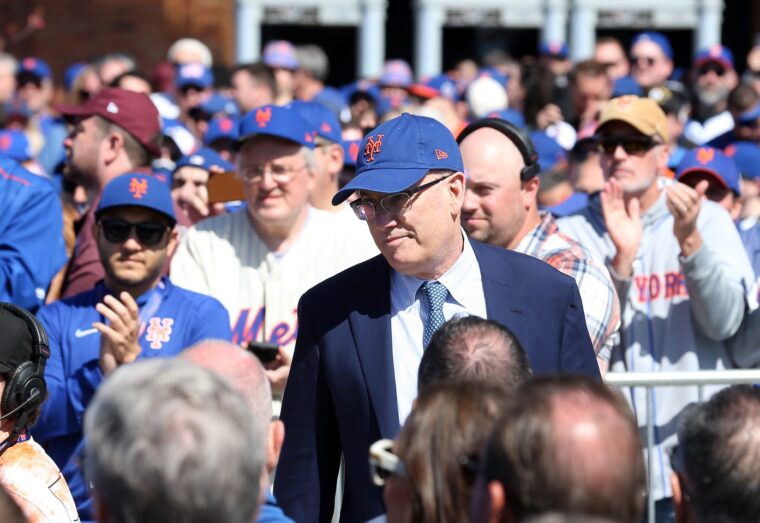
The biggest thing I take pride in is going out there and winning. You do it for the fans and for yourself, and you just take pride in it. To have an organization that felt the same way, I knew right there and then that it was what I wanted to be a part of.
MMO: Thanks very much for some time today, Danny. Best of luck in 2023.
Mendick: I appreciate it. Thanks!
Follow Danny Mendick on Twitter, @dmendick01


